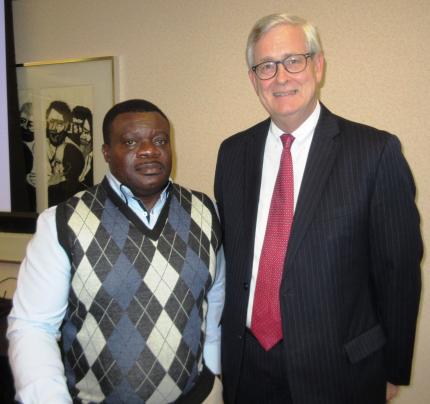Hands-on Research about Boko Haram

Joel Carpenter (right) and Edlyne Anugwom
Chris Meehan
Edlyne Anugwom describes how he and four colleagues were conducting research on the terrorist group Boko Haram in northeastern Nigeria when a group of heavily armed men came upon them suddenly.
The armed men didn’t make clear whether they were Boko Haram sympathizers or not, but they immediately began roughing them up, said Anugwom, who has received a grant from the Nagel Institute for the Study of World Christianity at Calvin College to conduct his work.
“They started yelling and shoving us around and asking us questions,” Anugwom said during a recent presentation of his research at the Prince Center at Calvin College.
“We were fortunate because our guides came rushing back, and the men cooled off and allowed us to continue on our way.”
Anugwom, who is no stranger to such incidents, leads one of 23 African research teams that have received grants from the Nagel Institute in a program funded by the John Templeton Foundation, said Joel Carpenter, director of the institute.
The Templeton Foundation has given the Nagel Institute more than $2 million to address the topic “Christianity and Social Change in Contemporary Africa.” The program, said Carpenter, has the goal of helping African scholars such as Anugwom address religious and social issues that have long been neglected in their society.
For example, Anugwom is studying the growth, and reasons behind it, of a terrorist organization that may represent a kind of religious renewal seeking social change and upheaval based on violence.
Of Anugwom and his work, and especially the hands-on approach he has taken, Carpenter said, “He is a brave and resourceful man who is getting results.”
Until now, the story of Boko Haram “has mainly been written by armchair experts who haven’t done the field work. He is an intrepid scholar . . . whose work and its lessons should be of concern to us all,” said Carpenter.
Anugwom said he has relied on books, news articles and scholarly papers and interviews with other experts as part of his study, but he said it has been crucial also for him to do firsthand research in the cities and villages in which Boko Haram operates and to talk to people who are closest to the terrorist struggle.
“We wanted the opportunity to get into places to talk to those who have lived through this,” he said.
In a presentation titled “Boko Haram and the Gospel of Terror in Nigeria,” Anugwom, who is a professor of anthropology at the University of the Western Cape in South Africa, offered a look at preliminary findings from intensive field work he did earlier this year.
He said he and his field staff were able to interview 92 people, ranging from Boko Haram sympathizers to those who strongly opposed the group, during trips to northeastern Nigeria, where the group has been terrorizing people for several years.
“Most of those who are members of Boko Haram are young people who are choked of opportunity and live in an atmosphere of hopelessness,” said Anugwom.
“No one in Boko Haram is over 40, and most are young men in their 20s. They are mostly illiterate and have no opportunity to advance themselves compared to youth in other parts of the country.”
Founded by Islamic cleric Mohammed Yusuf in the early 2000s, the group strongly opposes Western values and ideas, especially Western approaches to education.
But their targets are not limited to people from the West.
Over time, said Anugwom, the group has become more and more violent, embracing a brand of Islamic fundamentalism that calls for the death of all those, including Muslims, who don’t embrace their strict view of the religion.
“Until a few years ago, Boko Haram was popular. A lot of Muslims felt connected to what the group was fighting for,” he said.
Anugwom said that in the view of one person he interviewed, “the group originally was a welcome development as it sought to bring back the real Islam and even address some of our problems in Nigeria.”
However, that has changed as Boko Haram has burned mosques, indiscriminately bombed towns, kidnapped innocent school children, and killed Christians as well as non-Christians, including Muslim clerics.
“They are doing right in their own minds. There is no give and take with them,” said Anugwom. “They are probably the second-most brutal terrorist group behind the Islamic State.”
Some of those who are in Boko Haram, said Anugwom, don’t even seem to know why or for what they are fighting.
Among other tactics, Boko Haram makes regular use of social media tools to get their message out, especially relying on such avenues as YouTube to show videos of their activities, said Anugwom.
“They are the creations of a new media age that helps them to spread their message of terror,” he said.
Although it has shown support for other terrorist groups, such as the Islamic State, Boko Haram generally focuses its violence on Nigeria, and in the process it has killed thousands of people and displaced millions of others.
Despite its history of violence, said Anugwom, Boko Haram “may represent a new religious strategy for addressing perceived socioeconomic privation in the larger Nigerian society.”
There has been the tendency to focus on the violence of the group and to ignore “the underlying or driving force of the insurgence.”
“There are a number of salient questions that Boko Haram has raised,” he said. “Inasmuch as you can hate Boko Haram, they have important things to say about politics and the economy in Nigeria,” he said.
Joining the Nagel Institute as cosponsors of Anugwom’s lecture were the Paul B. Henry Institute for the Study of Christianity and Politics, International Development Studies at Calvin, and the Calvin College Faith and Citizenship Initiative.


